
Hunting down the right parts usually takes more time than soldering everything together. I can’t count the number of projects that I tried to build and couldn’t find some key component that’s no longer made. You can help put together a list of suppliers at the end, but the idea is to have a quick reference to get your projects rolling (saving your money for important things, like espresso). Even if you’re familiar with the usual electronics parts shops, chime in to help me create a list of the best suppliers to fuel those hardware hacking projects.

If you want to keep your money, I’d avoid RadioShack as much as possible. When you’re stuck because you can’t find a freaking 10kohm resistor, it’s fine, but the markup on their low quality parts is insane-their clearance prices aren’t too bad. As much as people bag on RadioShack, just remember that nobody else bothers to sell electronic parts in the middle of nowhere.
Shipping can eat your project budget quicker than anything else. It’s the reason that I’m sometimes willing to pay $1 for $.05 in resistors at RadioShack. When I’m buying parts, I try to buy from a single supplier if possible to maximize my parts budget.
Stocking up on parts in bulk can help make projects extra affordable later on. Buying a quantity of resistors, capacitors, PNP and NPN transistors and a decent supply of linear voltage regulators will save you a fair amount of money later on. I love it when I can build a $30 project for the cost of a proto-board and an odd capacitor.
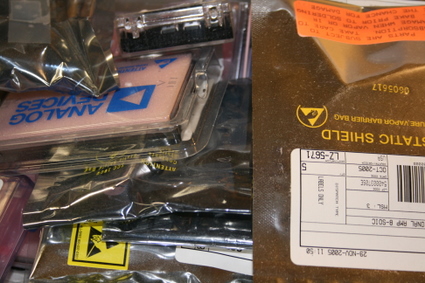
Just about every electronics component manufacturer will provide free samples on request. That’s right – free. It’s usually just a matter of creating an account on the manufacturers web site and selecting the components you need. As a rule, I don’t mention when I’ve sampled parts for a project. Seriously, they’ll get a little suspicious if 100 people suddenly sample the exact same parts. Samples aren’t limited to semiconductor companies. [ladyada] has a nice list of sample providers, including enclosures and connectors.
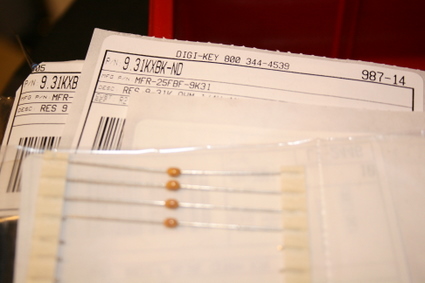
Digi-Key carries just about every part you can think of. These guys prefer to sell large quantities, but they’re happy to take small orders. Orders are shipped out fast, but they’ll tack on an extra $5 fee if your order is under $25. Even if you’re not ordering, they usually have data sheets linked for every part they carry online. If you’re wiling to jump through the hoops, you can even create a parts order that’s linkable from your website – it can make it much easier to share a project with others, but I usually find that a few part numbers get deprecated as time goes by. Oh, and they’ll send you a massive parts catalog that’s handy for parts hunting and brain storming.
Mouser Electronics is one of my favorite suppliers these days. They have reasonable shipping options and are fast with UPS ground orders showing up at my house within two days. Their inventory isn’t always the best, but substitution parts are usually easy to find because the online catalog links to web enabled PDF pages from their print catalog. It makes cross-referencing very easy. Like Digi-Key, they’ll send you a massive parts catalog to shove under your monitor.
Futurlec is a great place to get incredibly cheap parts, but you won’t be seeing your order for about a month (ok, so my last order showed up after three weeks). I suggest stocking up on connector headers and resistors. I haven’t had to make a late night resistor run in a couple of years thanks to these guys.
Sparkfun electronics is like a candy shop for Hack-A-Day readers. They carry higher end parts like GPS units, GMRS modules and micro controller programmers. Pricing varies a bit, but I can always find something interesting there. If you prefer professionally made PC Boards, they even put together an inexpensive PC Board service.
ebay is one of my favorite places to shop for parts. It’s a great place to buy brand new $150 stepper motors for $20 or hunt down funky, hackable hardware. People certainly try to sell single components, but it’s usually not worth the effort.
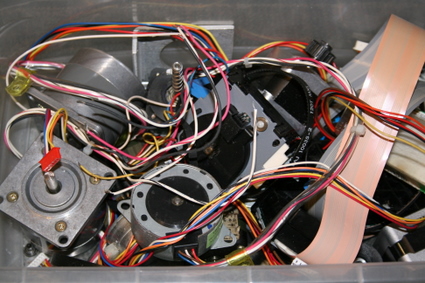
Salvaging parts is the absolute cheapest method for parts shopping. Thanks to custom ICs and SMD parts, newer electronics don’t normally have much in the way of salvage value. On the other hand, older hardware is a great source for parts. My current favorite salvage source is the dot matrix printer. They’re easy to take apart, have nice power supplies, and they’re loaded with quality heat sinks, wiring, connectors, hardened steel rods, and stepper motors. The bigger the dot matrix printer, the bigger the stepper motor. If you can score a few of the same model, you’ll end up with a few matched sets. People hate throwing them away, so they’re easy to get for free.
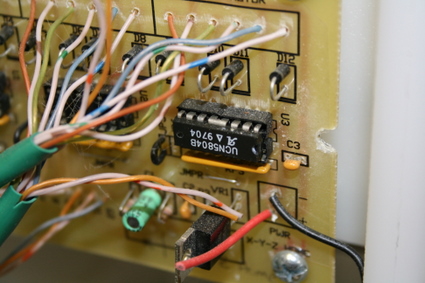
Lack of availability can be a problem, but obsolete parts are another way to keep costs down. Originally, the UCN5804B stepper driver I used for the cutting board CNC machine cost about $16 each. Now that they’re deprecated, they can be had for about $5 each.
Grab bags are another good way to save money. They’re usually full of loose parts that’ll have to be identified, but they’re cheap. The guys over at uchobby put together a nice how-to on sorting them.
Thanks to the movement from mail order to internet suppliers, the parts company scene is huge. There are loads of production part and surplus companies around. Here’s a quick list of shops that’ll probably be useful if you’re looking for parts.
Digi-Key electronics
Mouser electronics
Futurlec
Sparkfun electronics
eBay
All Electronics
BG Micro
American Science & Surplus
Goldmine Electronics
MPJA Online
MCM Electronics
Parts Express
Got a favorite shop? Drop the link in the comments and I’ll add it to the list.








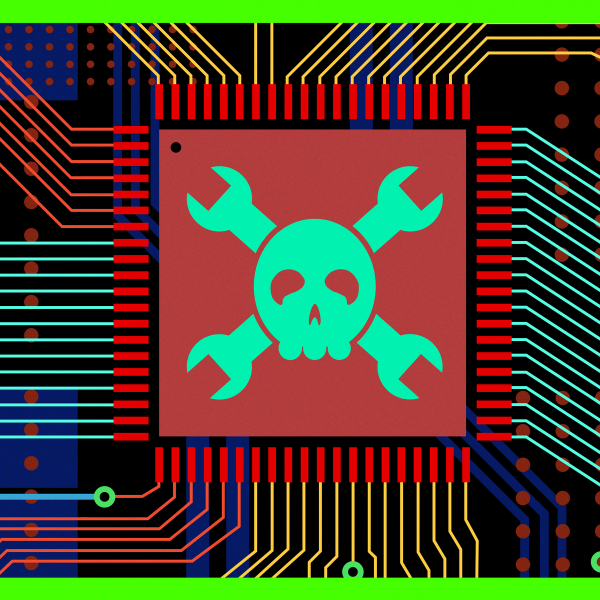






Oh, I have me some stepper motors to sell on ebay, believe you me!
I came across this place a long time ago and love it..
and they will try and work with you on the price .. awsome mom and pop place …there site could stand a new look but just give them a
call ask for kim tell her Dr PePPer sent you ..
http://www.midwestsurplus.net/
http://www.sciplus.com/
Everything from parachutes to motors to optics. Pretty reasonable too.
YES.I ALLWAYS LIKE TO KNOW ABOUT PCB.SO CAN YOU HELP ME.
yes i also need help from you.thanks you.
here’s my del.isi.ousness :)
http://del.icio.us/superDog7/suppliers
thnx to y’all! found some nice gems in the post and comments
A friend of mine has started an electronic parts company. It is very small at present, but he is adding new items to his inventory all the time. I have purchased capacitors and pots from him, and he sells them at half the price the large distributors charge. And he doesn’t give me a price break just because I’m his friend. His site is http://www.eemart.org . Cheers ! — Ken Nelson, Denver, Colorado
I personally like newark:
http://www.newark.com/
http://www.surplustronics.com is a great place to go for parts, especially if you live in new zealand as thats where they are based, they also happen to be the only supplier of micro switches in new zealand.
I am not sure that I can completely understand your comments. Would you be so kind as to expand on your reasoning a little more before I comment.
Great list! You should add http://www.westfloridacomponents.com to your list.
Low shipping prices and no minimum purchase.
Micro solar and electronic part sales.
If you are in the Dallas, TX area, try Tanner Electronics.
http://www.tannerelectronics.com/
For Hardware try Altex.
http://www.altex.com
http://oemstrade.com/
I use this site a lot, it searches all sorts of distributors at the same time. It is only helpful if you already know the part you are looking for, but helps you find where it is in stock/the cheapest
Good dealer of surplus parts is http://www.westfloridacomponents.com
If you live near London you can always apply online to our e-store. We sale electronics allover the world.
In the UK;
bitsbox.co.uk is a great source of simple bits like passives, common micros, 74 series logic, 555 timers, that sort of thing.
farnell (uk.farnell.com) are good for your more complex parts, they have a lot of stuff and you can buy a lot of it in quants of one.. if you buy about 20 quids worth a time the delivery is free I think. Best thing is that you can ring them up and actually speak to a human and they’re still like a family business.
In Japan:
akizukidenshi.com have almost everything you can ever want. COD service is awesome. :)
http://www.chip1stop.com is good for parts you can’t get at akizuki.. Like maybe FPGAs, parts not so common in the hobby sector. Delivery is free on orders over 5000 yen, which you can easily spend on the big processors and stuff they stock.
I got some prototype PCBs from San Francisco Circuits. Great service and quality, although a bit pricey:
http://www.sfcircuits.com
Possibly the most useful post and comments on this site ever. Bg micro often has nice deals and awesome shipping costs. Under four bucks for a 6 oz package from Texas to Canada.
It takes more time, a little sweat, and often frustration but harvesting components from junk electronics is the cheapest option. I got about 20+ caps from an old motherboard. Any computer store likely will have something to tear apart.
@Paul~
Let’s see… The average salary for an electrical engineer is about $67000 per year. That comes to about $32 per hour at a 40 hour week… if it takes 2 minutes apiece to remove those caps then you are getting them at about a dollar each not counting the time to get the MB or other component. I think I’ll order them from the most expensive place I can find for fifty cent.(radio shack) Or I could buy them here: http://www.taydaelectronics.com/capacitors/electrolytic-capacitors.html
Of course your method is ecologically sound but I don’t know about the cheapest option.
If you’re in the St. Louis area, Gateway electronics is the place to go:
http://www.gatewaycatalog.com/
The website isn’t nearly a good representation of the store, though. Also fun, in the St. Louis area is Electronics Exchange, sort of a flea market for electronic things:
http://www.electronics-exchange.com/
What!!!
http://www.taydaelectronics.com/
OHHHH YEAH!!(says the cool-aid guy)
Fast and cheap.
You have missed one of the major player of this field, RS Components the world leading High Service Distributor of electronic, electrical & industrial products. Having present in 32 countries RS serves 2 million customers worldwide with 550,000 products from 2500 brands. RS Components India has been operational for over 20 years in the country.
http://www.endlessparts.com/